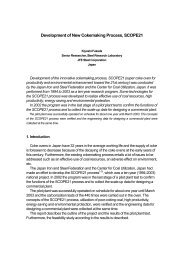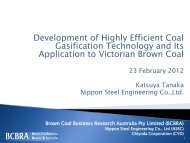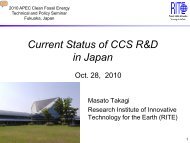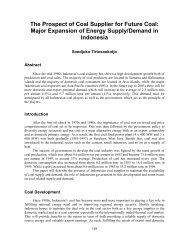Defining CCS Ready: An Approach to An International Definition
Defining CCS Ready: An Approach to An International Definition
Defining CCS Ready: An Approach to An International Definition
- No tags were found...
You also want an ePaper? Increase the reach of your titles
YUMPU automatically turns print PDFs into web optimized ePapers that Google loves.
Appendix C: Policy Considerations and Assessments of <strong>CCS</strong> <strong>Ready</strong> EconomicsThe results of the Accelerated GHG Restrictions sensitivity case show that the powerplants without <strong>CCS</strong> retrofits have 4.4 year shorter expected lives: 33.4 years versus 37.8years in the Base Case. As would be expected, the retrofits <strong>to</strong> <strong>CCS</strong> occur more quickly forall plant design options. The Not <strong>CCS</strong> <strong>Ready</strong> option goes <strong>to</strong> <strong>CCS</strong> an average of 1.0 yearssooner, <strong>CCS</strong> <strong>Ready</strong> 1 option retrofits 1.5 years sooner, <strong>CCS</strong> <strong>Ready</strong> option 2 retrofits 2.2years sooner, and the <strong>CCS</strong> <strong>Ready</strong> 3 option goes <strong>to</strong> <strong>CCS</strong> 4.9 years earlier. Also, the percen<strong>to</strong>f scenarios in which the plants convert <strong>to</strong> <strong>CCS</strong> is higher with 93 percent retrofitting ofeven in the No <strong>CCS</strong> <strong>Ready</strong> option.The relative economic attractiveness of the more intense <strong>CCS</strong> <strong>Ready</strong> options increases inthe Accelerate GHG Restrictions sensitivity case. The net present values of the plantsdecline by about $89,000 per MW in the Not <strong>CCS</strong> <strong>Ready</strong> option <strong>to</strong> $53,000 in the <strong>CCS</strong><strong>Ready</strong> 3 option. The decline in value stems from the higher allowances prices, which are notfully compensated by higher electricity prices. The more intense <strong>CCS</strong> <strong>Ready</strong> options declineless in value because they are more economic <strong>to</strong> convert <strong>to</strong> <strong>CCS</strong> and thus retrofit soonerand operate at higher utilization rates. The order of preference among the four optionsdoes not change in Accelerate GHG Restrictions sensitivity case, as the Not <strong>CCS</strong> <strong>Ready</strong>option still has the highest private sec<strong>to</strong>r NPV.C.4.9 Sensitivity Case: Pricing of Natural Gas and ElectricityThe second sensitivity case assumes that natural gas prices are $1.00 <strong>to</strong> $1.25 per MMBtuless expensive than in the in the Base Case. Such a sensitivity case might be justified by moreoptimistic views for the prospects for gas shales and other kinds of non-conventional gasesin the US, Canada and possibly other countries. This assumption of lower natural gas priceshas the effect of dropping electricity prices from about $9.00 <strong>to</strong> $2.00 per MWhr. The keyinputs <strong>to</strong> this case are shown in Exhibit C-12 and the summary outputs are shown in ExhibitC-13 and Exhibit C-14.The most important impact of these changes is <strong>to</strong> make the NPV of all four coal powerplant options negative, even with the option <strong>to</strong> retrofit. This means that the desired returnon investment of 9 percent real after taxes, on average, would not be achieved and thepower plant would not be built by developers if this price environment were anticipated.The lower electricity prices cause the <strong>CCS</strong> retrofits <strong>to</strong> occur a little (0.6 <strong>to</strong> 1.1 years)sooner than in the Base Case. The order of preference among the four options does notchange in Lower Natural Gas sensitivity case, as the Not <strong>CCS</strong> <strong>Ready</strong> option still has thehighest private sec<strong>to</strong>r NPV and the <strong>CCS</strong> <strong>Ready</strong> 3 has the lowest.23 February 2010 119
















